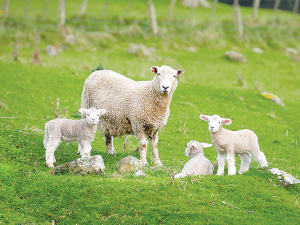Weaning time is looming and farmers are encouraged to consider a number of factors when deciding to wean, rather than sticking to a specific date every year.
Beef + Lamb New Zealand's senior advisor biosecurity and animal welfare Will Halliday says lamb weaning dates should be flexible depending on the season and the market.
"No two seasons are identical so being flexible about weaning dates can be a powerful tool," he explains. "It is important to be monitoring stock condition, feed quality and quantity and market prices to inform the decision about weaning dates."
Halliday says the goal at weaning is to maximise profit from lamb sales and ensure ewes' target body condition core is met, so next year's production is not compromised.
He adds that a number of variables should be taken into account when deciding when to wean. These include the age, weights and growth rates of the lambs, ewe condition, feed quality and availability now and over the next three months, the cost of supplements, animal health status of both ewes and lambs and lamb prices, both store and schedule.
Halliday says growth rates peak when lambs are between three and six weeks of age.
However, he adds that growth rates can stay high in late lactation provided lambs have plenty of high-quality feed available to them.
"By eight weeks, lamb growth rates are generally declining with very little growth benefit coming from the ewe's milk."
However, Halliday explains that lambs weaned before six weeks cannot make up for lost milk by consuming more pasture.
"And lambs weaned before eight weeks will typically grow slower than lambs left on their mothers, unless high quality forage is available," he says. "This means that if lambs are within 2-3kg of sale weight, they will reach this weight faster if left on the ewe."



















